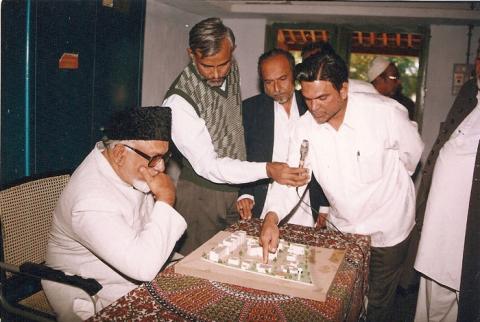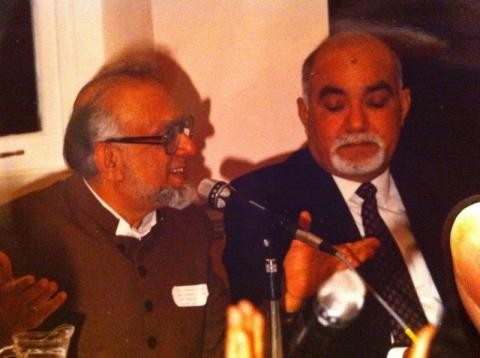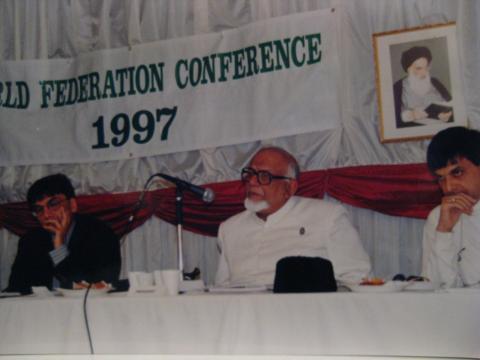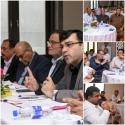India Federation holds the 4th Supreme Council Meeting, click here for more information on the topics discussed.
As children, one of the things he did which I missed very much later on in life is that he would take us for drives. We would all sit in the car and he would drive in the suburbs of the city and sometimes we would end up having a meal outside. (Shaykh Abbas Jaffer)

A Day with Marhum Mulla Saheb
To mark the death anniversary of our founder, Marhum Mulla Asgherali M M Jaffer, The Khoja Heritage Project of WF took the opportunity to speak to his son, Shaykh Abbas Jaffer (henceforth SAJ), to find out more about what Marhum Mulla Asghar was like at home with his family and how he divided his time between his job as an optician, his community work and his family.
WF: Mulla Saheb is an exemplary figure for the entire community and his profound contribution is second to none. We wonder how was he able to manage his daily affairs, given he was engrossed in many community activities.
SAJ: May Allah swt reward you for all your good works for the community. When we lived in Nairobi, my father used to spend his day at work at his optician’s shop. In his free time, he would get busy in community work, but when he came home, he was rarely occupied with community work. I recall that for a long time we did not have a phone at home. So in Nairobi, when there was a phone call for us, it would be at the neighbours and they would come and knock and say there’s a phone call so it wouldn’t happen often that in the evening he would be occupied with community work. However, our house in Nairobi was constantly visited by visitors; scholars as well as anyone who was passing by Nairobi who knew him. My childhood was filled with constant comings and goings of people. I remember that very distinctly that there would always be a guest at home and whenever we had dinner there would always be someone, most of the time who was either passing through or pappa had grabbed him from the mosque. The rest of the time, as children, one of the things he did which I missed very much later on in life is that he would take us for drives. We would all sit in the car and he would drive in the suburbs of the city and sometimes we would end up having a meal outside. Those are the things I remember in the early days. Well, this was during pappa’s time as Secretary General of Africa Federation and he did not bring his community work home with him.
WF: Was the routine same when he moved to London?
SAJ: Following his incarceration in Iraq, Marhum pappa moved to London. It was not his plan to move here, although he changed his mind when he came here and then settled down in London. It was his plan to visit and then come back. However, in time, all of us joined him here. My brother and sister early on, my eldest sister had already married here in London and then I joined them in 1986. Papa had come here in 1984. This time, things were very different. He was very much involved in community affairs. Especially, he was involved in Stanmore. The Stanmore centre had just been bought and he was handling the programmes in the centre and was reciting the programmes in the centre. He was quite involved there and then he took over at The World Federation as well, then things changed. Sometimes, there would be work at home but even then, his home life was more to do with reading and his own scholarly pursuits. Unless someone phoned him at home, generally, the community work was done in the office. He was reading a lot. In all of our memories of pappa, always there would be a book nearby. Even when he was sitting with us, a book was always nearby. He would talk and get involved and hold a conversation and then go back to what he was reading.
WF: A less known fact about Mulla Saheb’s personal life is that he was a good businessman. Would you kindly share his early struggles in regards to his business? Did he continue with the same business when he moved to UK?
SAJ: When my dadabapa passed away, my father was very young. My grandfather was in his fifties and my father was 24 and he had 9 siblings under him; he was the eldest of ten. At that time, what he did was, although he was teaching in Madrasah and night schools, he looked at what could be done to facilitate the education and well-being of the rest of the brothers and sisters who were growing up. He began to run my grandfather’s optician shop and then as the brothers became older he included them in the shop. He then realised that with 6 brothers coming up, one by one the Mombasa shop wouldn’t be enough. He decided to go to Arusha for a few months with a close friend and started a new shop in Arusha. After it was established, he sent his brother there. He then migrated to Nairobi where he opened another optician shop and then an optical factory. Once they were all settled and married, he only worked in the factory with one brother. That’s how things worked until he came to London. Before he came to London he apportioned all the shares and everyone was happy and he left. When he came to England, he was getting income from his shares on a monthly basis which he was using for his livelihood. He was not working in optics anymore. The only time I remember him working in optics in addition to these shops is when he decided that during to changing requirement in the optical profession, he needed a formal diploma and so he went to Bombay to do a course in optics and he qualified in the late 60s.

WF: Moving to his scholarly persona, his contribution to Shi’ite Studies has been profound. He translated some seminal works such as al-Amali of Shaykh al-Mufid. He also translated Islamic Laws of Ayatullah Sistani and many other major and minor works. Tell us about his translation skills and most importantly how he manged to do with other community and family commitments?
SAJ: Marhum papa never used computers, he had some sort of mistrust on computers although I tried in the later part of his life to show him the benefit of computers. My father was a little bit hesitant. He never was comfortable with computers. When he used to receive emails, they would be printed out and he would write a response and Masumabai would type out a respond and send the email back.
Anyways, I have seen him with his long pad and the book he was translating and he would translate different works in the morning before Zohrfor two or so hours. He was able to do it relatively peacefully without interruptions and very fast. For example, I remember when Marhum Ayatullah Khoei passed away, Marhum Pappa said we need to quickly get a risalah of Ayatuallah Marhum Gulpaygani and he produced that work within a couple of months. I remember because I had to type it! This was his way and the morning time was a productive time for him. Most of his translation work would be done like this in the mornings. His habit was that he would be back from work at about 3:30-4pm and again he would sit and translate at that time. He was able to produce some good quality work in relatively short times. One of the things we learnt a lot from pappa is focus and determination. He was able to bring focus to tasks very well.
WF: But still, the titles he chose for translations and his own works were carefully chosen. Was it the demand of time or he foresee the need of it at some later stage?
SAJ: Pappa was a person, and it was a bit strange watching him, because he would sometimes just be sitting and thinking and that would sometimes take 45 minutes and you can see him quietly in his room just pondering and If you go to see if he’s asleep – he’s not. He would think about different needs and then when he perceived the need either because of conversations he was having with other shia scholars or within the community then he would produce the work in that regard or if he was directly asked. He was approached by people in India who said they hadn’t received any publications in Gujarati for some time so he wrote a couple of books for them. He was able to do that and, mashAllah, if you look at some of his personal notebooks that we have got, he wrote excerpts, if something interested him, in that original language. He had a different script for Arabic and Farsi and Urdu, which I found interesting. He wrote in several languages and was comfortable in many different languages.
WF: Tell us more about his rest and sleeping schedule.
SAJ: As long as I remember, certainly in London when I was older and could observe him closer, was that he had a habit of sleeping relatively early. It was unlikely he would be awake after 10pm. He would wake up fairly early as well so throughout his life, his habit would be that he would be awake an hour before salaat time always. He had this habit which we still laugh about, he would make tea but he would make tea the old fashioned Kenyan way, which we didn’t drink so he would only make one cup for him and one for my mother. He would wake her up for salaat with a cup of tea. The best and most productive time for him, and the best time to get him on the phone for those who knew was to get him on the phone after salaat time at 5-6am. He would stay awake until 9am, rest for a while and then come to the WF office for 10am. This was his daily routine.
WF: All these works need a lot of commitment and a thorough planning. Was able to meet the so called deadlines?
SAJ: What I found about Marhum pappa is that he was a man who planned. He had vision. He would decide on the need and would make a survey of the needs; whether personal or communal and he would make a plan and then have tremendous energy, for that. That’s what he did with his personal and community life. Once he decided the community would be better for certain things, he would be very determined to push through and see it to its end.’One thing he would say, and I remember asking him once ‘what is the sign of maturity?’. I remember this conversation very well. I asked ‘what is the sign that makes a person know they are mature?’ and he looked at me and gave an answer which haunted me for a long time actually. He said ‘the sign that you are mentally mature is that when you decide on a project you’ll not leave it half way and then start another, you will finish it before you embark on something else otherwise that business of starting and stopping and then looking at another shiny pebble and starting is a sign of an immature mind.’
WF: Mualla saheb delivered lectures in many languages. We have around 400 lectures which are recorded and many more that might not have been recorded. Do you recall how he used to prepare for his lectures and majalis, given that those speeches were not only rich in eloquent but also in substance?
SAJ: It’s very odd, I did not ever see him writing lectures or whatever, but Marhum pappa had a gift which was a gift of memory. I remember he had a remarkable memory. A lot of people came across the fact that if he met someone once, he would not forget their name or where they met and this was something, he told me, that he realised as a teenager that he could retain information. He realised this was a gift and applied it to languages and other things. He had this gift and that allowed him to learn the language and be knowledgeable about it scripture, literature and poetry and would even write poetry. I remember an anecdote from Marhum Fidahussein Hamir of Dar es Salaam. After pappa passed away, I asked Marhum Fidahussein for some personal anecdotes of my father and he was talking about his memory. He said ‘your father was here in my house for dinner two years before he passed away and as he entered, someone called and asked if he would do a lecture that night at mosque and he agreed. While he was talking to me, he asked for a copy of the Qur’an. While we were talking, he was looking through in various places and then put it to the side. That night, during the lecture, he mentioned over 15 verses from different chapters of the Qur’an to back up the points he made.’ I think what he used to do was that he had an idea that he wanted to speak about and then possibly he would use material he was reading. Pappa used to read a lot and he would store that information for use later on when the need arose. He was able to recite very useful lectures at very short notice. I think that happened because his gathering of material was happening on a constant, almost daily, basis. He may well have been preparing his lectures in the office, I’m not sure. You would never hear ‘do not disturb papa at home, he is writing a lecture’ but my children are told that at home! Sometimes he would give academic lectures, which weren’t in the community. I remember, for example, he was giving lectures abroad which would be attended by other Ulema, he would prepare material and write something. I’ve seen these in his notes. But generally, he had that ability, mashAllah. Just a few years ago, someone had passed away in the extended family and they had kept majlis in their home for 7 nights and they were keeping Marhum pappa’s lectures. I was hearing them after a long time and I remember thinking and commenting to my wife that these are timeless lectures. 20-odd years on we are hearing these and still there is a freshness and relevance to them which I think he was blessed with being able to do.’
WF: What about his family commitment? Would you say he compromised on his family commitments due to his heavy presence in community affairs?
SAJ: After pappa came to England, he was much busier but he kept in touch with his family. His sisters were local so he would visit them a lot. Back in Kenya, it was his habit to visit his sisters, even after they got married. He would pop in on his way to namaz and sit for half an hour every few days. He would meet his brothers every day in the workplace. It was his habit that for at least of the weddings of the first child of his siblings, even after the family spread to Canada, the United States and elsewhere. He would always make time in his schedule. So all of the first children can say ‘Bapaji came to our wedding’. It was not always possible for him to be at every wedding because our family is big but he would stay in touch and there is tremendous respect and love amongst his siblings for him, which was not just because he was the eldest sibling but also because he showed that love and care for them.’
WF: The saga of WF is entangled with Marhum Mulla Saheb’s passion and commitment. Our readers would love to read about this journey and most importantly his management skills.
SAJ: I don’t understand how he was able to bring some remarkable management techniques, without any training, to his community work. He had a love for people and he had this vision – he would always look 5 or 10 years ahead. If you look at, with hindsight, some of the things he did, not many would have been able to. Even the institution of WF, which is something I think he just came up with saying ‘we need to yoke the communities after this diaspora and we are going everywhere in the world – we need to have some connection on a global level’. I remember he met the Marajah in 1975 and pitched the idea to them and got their blessing and support and I remember being a 9-year-old with him on that trip, which took 7 months. We were in Najaf for a month, then Dubai, Pakistan and so on where he was meeting with scholars and community members and asking for their thoughts on the idea. I remember meeting many Ayatullah - Khoie, Khomeini, Baqir al-sadr with him where some of the conversations would go on for hours with pappa speaking in Farsi and getting a response in Arabic – both would speak in the language that was comfortable for them but both understood each other. In that way, he tried to get the support of community and the Marajah and then came up with the idea of the WF. I think this was born from identifying the need and also, he was surrounded by very able people, mashAllah. It’s not just about one person, although he was a large figure, it’s sometimes hard to see there were other very important figures who he himself relied on to deliver their expertise.

WF: Thank you so much for your time and sharing some most inspirational anecdotes from Marhum Mulla’s life. The entire community has benefited from his great services and we are sure many of us would have several anecdotes to share. Hopefully, these gets documented as his life and memories continue to shine and his ‘relentless endeavours’ keep us motivating.
SAJ: May Allah swt bless you.
Related News
Related News
The World Federation Accredited Certification for TSP hits important Milestones in Africa
The World Federation is pleased to share with you the Annual Review for 2017/18.











